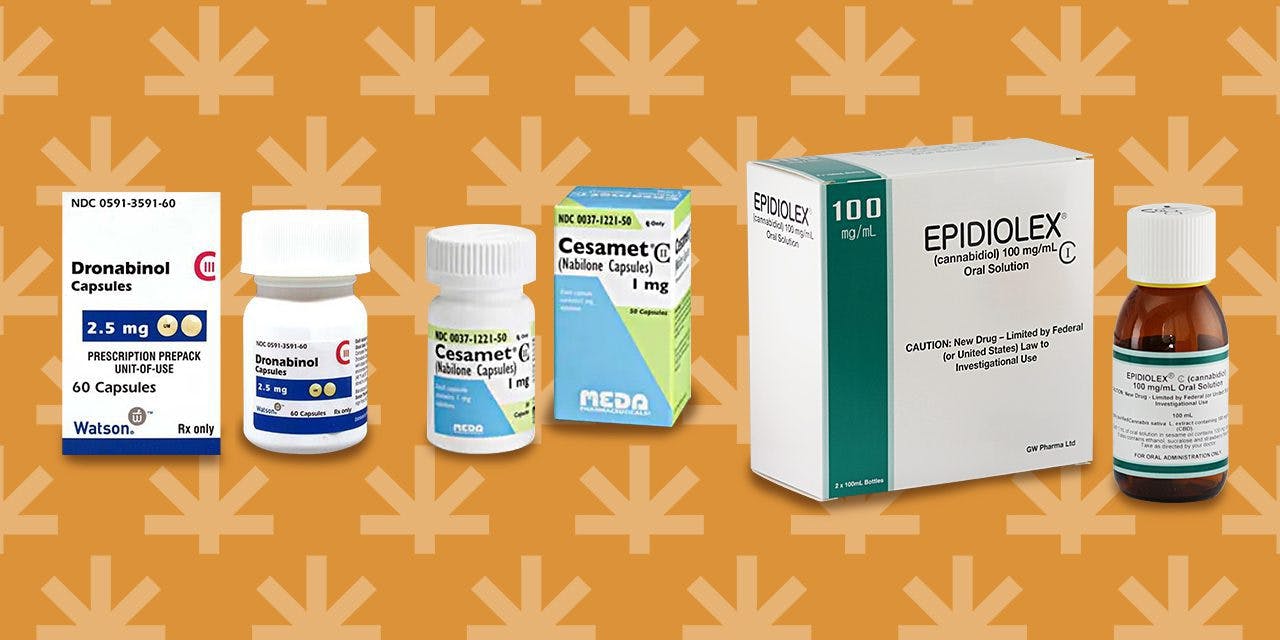Delta-8 vs. Delta-9 vs. Delta-10: What’s the Difference?

Article written by

Dipak HemrajHead of Research and Education
Content reviewed by

Dr. Lewis JasseyMedical Director - Pediatric Medicine
Delta-8, delta-9, and delta-10 are all forms of tetrahydrocannabinol (THC). THC is a cannabinoid, or naturally occurring chemical compound found in marijuana plants. THC is well-known for its psychoactive effects that can cause the “high” feeling people experience when consuming it.
The main difference between these three cannabinoids is their potency. Delta-9 is the strongest, delta-10 is the mildest, and delta-8 (you guessed it) is right in the middle. While they have a similar chemical formula, each compound has a slightly molecular structure, causing them to yield slightly different therapeutic effects.
Get your medical marijuana card
Connect with a licensed physician online in minutes.
What Is Delta-8?
Delta-8 THC is a psychoactive substance that’s garnered more attention recently. Unlike the prolific delta-9, delta-8 is only found in minimal quantities in cannabis plants. Delta-8 products from hemp plants are popular as they can be easily produced in more concentrated amounts.
How It Works
Like other cannabinoids, delta-8 interacts with our body’s endocannabinoid system (ECS). Once in the system, delta-8 binds to cannabinoid receptors found throughout the nervous system producing different therapeutic effects.
Uses
Delta-8 has mild psychoactive properties, so like other THC products, it can get you high. However, this high is typically less intense and doesn’t last as long compared to the more potent delta-9.
You can use delta-8 in all sorts of ways including smoking, vaping, tinctures, distillates, edibles, and infused THC beverages.
Potential Benefits
Delta-8 THC may offer these potential medical benefits:
- Pain relief
- Stimulating appetite
- Relief from nausea or vomiting
- Relaxation
- Reducing anxiety
- Protecting the nervous system from injury and damage
- Increasing feelings of euphoria
Risks and Drawbacks
There is currently limited research on delta-8, so it’s any potential risks are unknown so far. However, delta-8 is suggested to have fewer adverse effects compared to stronger cannabis products like delta-9 THC.
That said, one of the issues with delta-8 THC is it’s not regulated like delta-9 is. Also, delta-8 is often synthetically manufactured using industrial chemicals, which could be far less safe. If you’re looking to try delta-8, it’s essential to read labels and know what chemicals have been added to any products you consume.
Other side effects and risks to watch out for include:
- Dry mouth
- Fatigue
- Red eyes
- Difficulty concentrating
- Short-term memory issues
- Altered sense of time
Delta-8 may also interact with certain medications like blood thinners, antidepressants, and anti-anxiety medications. If you’re taking prescription medication, it’s always a good idea to speak with a doctor before trying new cannabis products.
What Is Delta-9?
When someone talks about THC, they’re likely referring to delta-9. Arguably the most well-known cannabis compound, THC is one of the main cannabinoids found in abundance in marijuana plants.
How It Works
Like delta-8, delta-9 works with the endocannabinoid system and is able to form strong bonds with cannabinoid receptors in the brain and body.
Delta-9 is a partial agonist (a substance that causes physiological responses) of CB1 receptors and CB2 receptors. This means it binds to and activates cannabinoid receptors but not as strongly as a full agonist.
This could be one reason why the THC produced naturally from cannabis plants is so much more tolerable compared to other drugs and synthetic cannabinoids with greater binding affinities.
Uses
Delta-9 THC products come in a wide variety. They can be smoked, vaped, used in edibles, taken sublingually (under the tongue), or found in topical cannabis products.
Delta-9 can be for recreational use or medicinal purposes. Keep in mind the legal status of delta-9 depends on your state laws; THC products over 0.3% are still illegal at the federal level in the United States.
Potential Benefits
The health benefits of delta-9 THC depend on the strain (cultivar) and terpenes. Research has cited many medical uses for delta-9, including:
- Cancer and chemotherapy
- Nausea and vomiting
- Anxiety
- Post-traumatic stress disorder (PTSD)
- Autoimmune diseases
- Alzheimer’s disease
- Pain relief
- Improved sleep quality
- Appetite
- Muscle tremors
- Memory and brain cell growth
Risks and Drawbacks
Since delta-9 can be pretty potent, it does pose a risk for certain negative side effects. At high doses delta-9 can cause:
- Drowsiness
- Dry mouth
- Rapid heart rate
- Euphoria
- Lethargy
- Slurred speech
- Poor motor coordination
- Anxiety
- Paranoia
- Dizziness
- Headaches
What Is Delta-10?
Delta-10 THC is a minor cannabinoid found in cannabis plants and has similar effects to delta-8 THC. It’s commonly produced in a lab from hemp-derived cannabidiol (CBD) (meaning it’s originally sourced from hemp plants).
How It Works
Again, delta-10’s effects in the body are a result of its interactions with the ECS and how it binds to CB1 and CB2 receptors. Although delta-10 can make you feel intoxicated, it’s much less powerful compared to delta-9 and even delta-8.
Uses
Delta-10 is commonly used for vaping and smoking. It can also be incorporated into other cannabis products such as edibles, topicals, or tinctures.
Potential Benefits
While there isn’t much research on the medical benefits of delta-10 THC, anecdotal evidence suggests the cannabinoid could help with:
- Stress relief
- Reduced anxiety
- Enhanced creativity
- Feelings of euphoria
- More energy and alertness
Risks and Drawbacks
As we mentioned, delta-10 THC hasn’t been studied extensively, so the full extent of any adverse effects isn’t known yet.
This is especially true for synthetic cannabinoids (how delta-10 is often produced), so make sure you’re familiar with or have done your research before using certain cannabis products like THC or CBD oil.
Similarities and Differences Between Delta-8, Delta-9, and Delta-10
Of course, the big similarity between these three is they are all cannabinoids naturally produced by the cannabis plant.
They are isomers of each other, which means that although they have the same chemical formula, each is structurally unique. This is why while similar, all these deltas function just a little differently in the body.
For example, delta-9 is much stronger than delta-8, while delta-8 is stronger than delta-10. The differences here could be due to the location of a double bond in their molecular chain.
This chemical structure difference also lends to their naming convention: delta-8 has a double bond on its eighth carbon chain, delta-9 on its ninth carbon chain, and delta-10 on its tenth. Even these small molecular differences can have a drastic impact on how a compound behaves in the human body.
Another difference between the three cannabinoids is how abundant they are in cannabis plants. Delta-9, for example, is a major cannabinoid found in high quantities in marijuana plants, while the others are not as common.
In terms of similarities, delta-8, delta-9, and delta-10 all can have psychoactive effects and interact with our endocannabinoid systems to produce therapeutic effects like better sleep, pain relief, and improved mood.
How to Decide Which Is Best for You
When to Use Delta-8
Delta-8 THC is a good choice for those who want a milder high. Because of this, delta-8 may be well-suited for beginner cannabis users. Since delta-8 has relaxation effects on the body, it’s also a good cannabinoid for nighttime use.
Keep in mind we’re talking about delta-8 derived from cannabis — not industrially-produced delta-8 products being sold semi-legally.
When to Use Delta-9
For experienced users or people looking for a stronger high, delta-9-THC is a great option. This type of THC is also most commonly used for medicinal purposes due to its high potency.
It’s also more abundant in cannabis than other isomers of THC. If you’re seeking a milder delta-8-like high, try lower doses of delta-9 for comparable effects.
When to Use Delta-10
Delta-10 may be a good choice for people who want mild psychoactive effects. It’s an even better choice for beginner cannabis users as it’s less potent than delta-8.
Delta-10 is known for its uplifting effects, making it ideal for daytime use or when a burst of energy is needed. This again refers to natural delta-10 THC, not industrial, hemp-derived versions that utilize chemicals to create delta-10.
If you have safety concerns, make sure you know where you’re getting your products from to ensure they’re free from pollutants or other harmful substances.
Keep in mind that while delta-8 and delta-10 are legal in the United States thanks to the 2018 Farm Bill, delta-9 THC is still illegal on the federal level.
Frequently Asked Questions
Which is stronger: delta-8 or delta-10?
Regarding delta-8 vs. delta-10, delta-8 is stronger than delta-10, making delta-10 potentially a better option for those new to cannabis use.
Is delta-9 stronger than delta-8?
Yes, delta-9 is stronger than delta-8.
Is delta-10 THC legal?
Technically, delta-10 THC is federally legal thanks to the 2018 Farm Bill, as it’s primarily derived from hemp. That said, some states have labelled delta-10 illegal, so it’s essential to know the individual laws in your state. Some producers in the cannabis industry won’t ship to your state if the rules are unclear.



